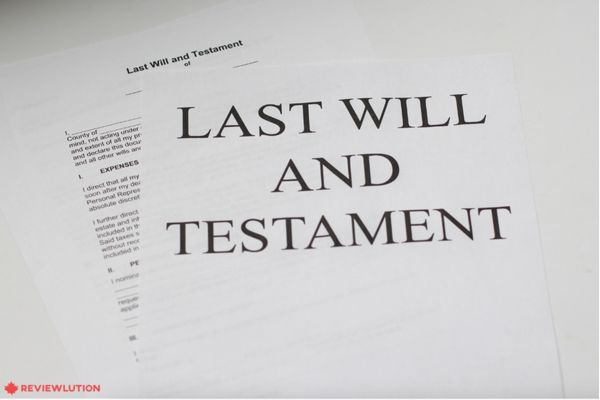Things to Consider When Making a Will in Canada
Thinking about finally making a will but don’t have the faintest idea where to start? Don’t worry, we’ve got you covered. Keep reading our detailed guide to learn all about it!
Let’s go!
What is a Will?
A will is a written document in which a person sets out how they want their property and possessions to be distributed after they die. It can also appoint someone to look after any children or pets.
In order for a will to be valid, it must be signed and witnessed. This means that the person making the will must sign it in front of two witnesses, who must also sign it.
What Does a Canadian Legal Will Contain?
A will usually contains the following information:
- the full name and address of the person making the will (the testator)
- the full name and address of the person or institution to receive the property and possessions after the testator dies (the beneficiary)
- a statement of who should look after any children or pets belonging to the testator after they die
- a list of all of the testator’s property and possessions, including their home, car, bank accounts, investments and any valuable items
- a declaration that this is the testator’s last will and testament
What is the Difference Between Will and Testament?
The main difference between a will and a testament is that a will is revocable, whereas a testament is not. This means that a person can change or revoke their will at any time, whereas they cannot change or revoke their testament.
You can make a last will and testament in Canada at any time, but it is generally advisable to do so when you are healthy and able to make decisions about your property and possessions.
How to Make a Will?
Making a will in Canada can be a daunting task, but it doesn’t have to be complicated. Here are some simple steps to follow.
Choose the Type of Will you Need
There are three types of wills: a simple will, a mirror will and a holographic will.
A simple will is the most common type of will. It is a straightforward document that is easy to understand and can be made without the help of a lawyer.
A mirror will is a will that is identical to the will of another person. This type of will can be useful if you want to make sure that your property and possessions are distributed in the same way as your partner, parent or other relatives.
A holographic will is a handwritten will that is not signed or witnessed. This type of will can only be used in certain circumstances, and it is important to seek legal advice before making one.
Choose the Assets you Want to Include
When creating a will, you will need to decide which assets you want to include. This may include your home, car, bank accounts, investments and any valuable items. You should also think about who you would like to receive these assets after you die.
You can change or add to your will at any time, so it’s important to keep it up-to-date.
Pick the Receivers
After you have decided what property and possessions you want to include, setting up a will also includes the process of picking the receivers. This is the person or institution who will receive the property and possessions after you die.
You can choose any person or institution you like, but it’s important to choose someone who you trust to handle your property and possessions responsibly.
Pick an Executor
Once you have chosen the receivers, according to the Government of Canada, your will kit needs to contain an appointed executor. This is the person who will be responsible for making sure that your wishes are carried out after you die.
The executor should be someone you trust and who is capable of handling this responsibility.
Pick Guardians for Your Children if any
Doing a will also involves guardians.
If you have children, you will need to appoint guardians for them in your will. This is the person or institution who will look after your children after you die. You should choose someone you trust and who is capable of taking on this responsibility.
Choose a Charity (Optional)
If you would like to choose a charity to receive a donation from your will, you can do so by including a clause in your will that states the name of the charity and the amount of money you would like to donate, when creating a will.
Save the Will in a Safe Place
Once you have finished making your will, it is important to save it in a safe place. This will ensure that it is protected and can be accessed when needed. You can save your will in a safe deposit box or with a solicitor.
Inform the Executor
It is also important to inform the executor about the whereabouts of your will. This will ensure that they can access it when needed. You can provide them with a copy of the will or tell them where to find it.
Tips to Making Your Own Will
Now that we’ve gone over the steps, the process might still seem a bit overwhelming. Still not sure how to prepare a will? Let’s make it easier.
Consult your Lawyer or Attorney
If you want to be sure that your will is in compliance with the law, it is best to consult your lawyer or attorney. They will be able to help you create a will that meets all the requirements and can advise you on the best way to distribute your property and possessions.
Discuss Your Will With Your Family and Friends
The making of a will should be a comforting time as old family memories are summoned and shared. Making a will now, it can serve as a way to say goodbye to close friends and loved ones.
When making the will, you have the opportunity to appoint those who will care for your children or guide them so that no one has an advantage over another person in terms of who gets what rightfully belongs to them. Everyone needs full transparency when going out on their own so bad blood is not created between those left behind after you die.
Finishing Thoughts
Making a will can be an emotional process, but it is important to think about who you would like to receive your assets after you die.
We hope our guide to making a will helped you get a better idea of what the whole procedure looks like as well as some other important things to consider.
FAQ
Yes, you can write your own will as long as it meets all the requirements of the law. However, it is best to consult a lawyer or attorney to make sure that your will is in compliance with the law.












